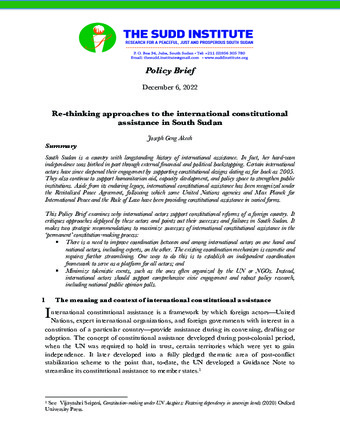Re-thinking approaches to the international constitutional assistance in South Sudan
Publication Summary
South Sudan is a country with longstanding history of international assistance. In fact, her hard-won independence was birthed in part through external financial and political backstopping. Certain international actors have since deepened their engagement by supporting constitutional designs dating as far back as 2005. They also continue to support humanitarian aid, capacity development, and policy space to strengthen public institutions. Aside from its enduring legacy, international constitutional assistance has been recognized under the Revitalised Peace Agreement, following which some United Nations agencies and Max Planck for International Peace and the Rule of Law have been providing constitutional assistance in varied forms.
This Policy Brief examines why international actors support constitutional reforms of a foreign country. It critiques approaches deployed by these actors and points out their successes and failures in South Sudan. It makes two strategic recommendations to maximize successes of international constitutional assistance in the ‘permanent’ constitution-making process:
- There is a need to improve coordination between and among international actors on one hand and national actors, including experts, on the other. The existing coordination mechanism is cosmetic and requires further streamlining. One way to do this is to establish an independent coordination framework to serve as a platform for all actors; and
- Minimize tokenistic events, such as the ones often organized by the UN or NGOs. Instead, international actors should support comprehensive civic engagement and robust policy research, including national public opinion polls.
Joseph Geng Akech is an Adjunct Assistant Professor of Law at the University of Juba. He holds a Doctor of Laws (LLD) in constitutional law, and he has published widely in constitutional designs, human rights, and transitional justice. He may be reached on e-mail: josephgakech@gmail.com.

